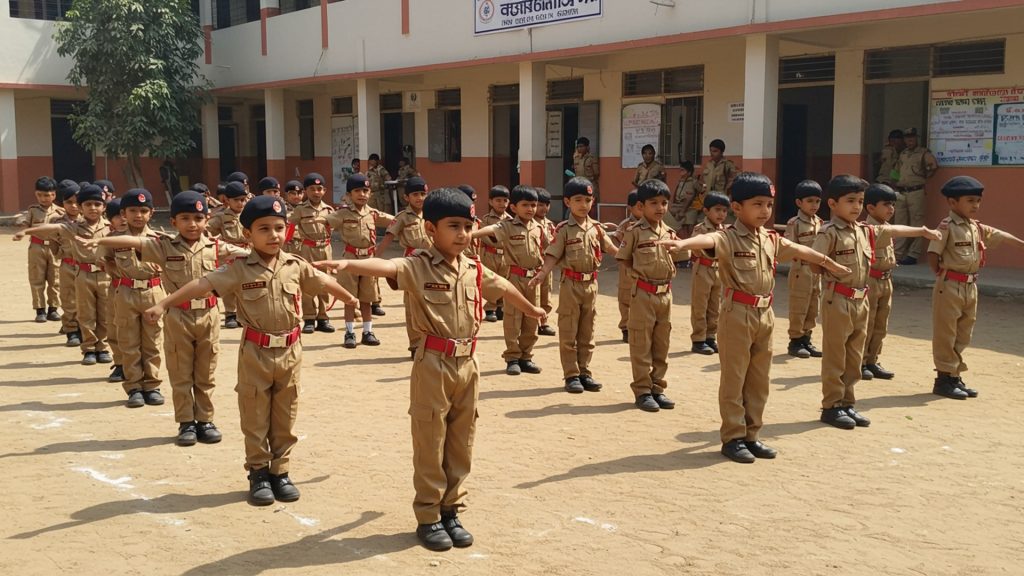Maharashtra is set to bring a major change to its education system, introducing training inspired by the National Cadet Corps (NCC) for primary school students across the state. This new program, aimed at building discipline and good character from a young age, will be rolled out soon, marking a big step for how young children learn. The move comes as the state government looks to instill values like patriotism, teamwork. leadership among young children, shifting how foundational education is seen in schools. This change means children will learn more than just school subjects, preparing them for a strong future.
New Initiative for Young Students
The state of Maharashtra has recently announced plans to introduce a new training program for primary school students, starting from Class 1. This initiative is designed to be similar to the training provided by the National Cadet Corps (NCC), focusing on developing discipline and a sense of patriotism from an early age. The announcement was made by Maharashtra’s School Education Minister, Dada Bhuse, following high-level discussions at the state secretariat to finalize the program’s framework. This move signifies a notable change in the state’s educational approach, aiming to combine academic learning with character building and civic engagement. Maharashtra is set to become the first state in India to implement such a structured military-style training for children as young as six years old.
Purpose of the Program
The main goal of this new training is to help create well-disciplined and nation-conscious citizens. Minister Bhuse stated that a key aim is to build strong values and respect for the country among students. The program is not about teaching combat skills. rather about developing character. Officials hope it will promote physical fitness, encourage daily physical exercise. instill a love for the country among young learners. The initiative is part of a wider government vision to move education beyond just textbooks and exams. The aim is to equip children with a complete sense of purpose, national identity. self-discipline, which are considered essential in today’s fast-changing world. The training is expected to cover awareness about India’s armed forces, civic duties, basic emergency preparedness. moral values.
What the Training Will Include
The program will target students beginning from Class 1, typically around six years of age. The training is planned to involve basic parade drills. These drills might also include marching to patriotic songs, especially during national celebrations like Independence Day. Beyond drills, the program will also include basic physical exercises and activities that help students work together as a team. There will also be modules on civic education, designed to encourage national pride and social responsibility. To make sure the training is carried out properly, the state government plans to involve a large number of retired armed forces personnel. These ex-servicemen will serve as drill instructors in schools. They will work alongside existing school physical education teachers, as well as officers from the National Cadet Corps (NCC) and members of the Scouts and Guides movement. This collaboration aims to ensure that the training is suitable for the age group and helps in constructive development. The National Cadet Corps (NCC) is a voluntary organization that trains young people in military values, aiming to mold them into disciplined, patriotic. responsible citizens. It operates under the Ministry of Defence. Currently, Maharashtra has seven NCC groups and 63 active units. These units provide training to over 1. 14 lakh cadets across 1,726 schools and colleges. The state government also intends to expand the NCC program by adding 10 more training centres. This expansion is expected to allow an additional 20,314 students to take part in the program. The state will also ask the central government for support to increase the number of NCC training centres in Maharashtra.
Expert Views on Early Training
The announcement of this program has led to different views from various groups. School Education Minister Dada Bhuse has strongly emphasized the benefits, stating, “We want to instill a love for the country, encourage regular physical exercise. develop a sense of discipline in students.” He believes this initiative will help prepare the next generation to be strong, ethical. socially responsible citizens. But, some educators and experts have raised concerns about the age-appropriateness of such training for very young children. Mahendra Ganpule, who was previously the vice-president of the Maharashtra School Principals’ Association, questioned the idea of introducing such programs at the primary level. He pointed out that a child in Class 1 is usually five or six years old and might not fully interpret concepts like “country” or “patriotism.” Mr. Ganpule also raised concerns about the way the decision was made, suggesting it might have been announced without enough discussion or planning. Child psychologists generally advise against basic military training for children as young as six years old. They believe it can cause too much stress for young children and disrupt their natural growth. These experts argue that young children need environments that encourage creativity, play. learning, rather than strict routines. There are also concerns about whether such training could go against international rules, like the UN Convention on the Rights of the Child, especially if it involves any form of forced participation, weapons, or simulated fights. Instead of military-style drills, some experts suggest child-friendly alternatives to promote discipline, physical fitness. teamwork. These include sports programs, scouting activities like the Scouts and Guides. martial arts that focus on ethical values. Studies on early childhood development highlight the importance of character building from a young age to shape morals and personality for long-term growth. It is suggested that character education should offer diverse activities that allow children to practice good behavior and see the results of their actions. This process needs the active involvement of teachers, parents. the wider community.
Steps for Carrying Out the Plan
The state government is still working on the detailed plan for how this training will be put into action. As of now, specific details regarding the exact timeline, how the training will fit into the school curriculum. the exact methods for training have not been fully released by the education department. A practical challenge noted is that the current NCC staff may not be enough to provide training in every school. This is why the government is considering bringing in retired military personnel to help with the training through the ex-servicemen welfare board. The government’s ‘100-day action plan’ for improving education in Maharashtra, presented earlier this year, includes various measures to enhance teaching quality, improve school buildings. boost overall student progress. This broader strategy also includes plans to introduce a revised State Curriculum Framework (SCF) that matches the National Education Policy from the academic year 2025-26. These efforts indicate a focus on holistic development in the state’s education system. The success of this new NCC-inspired training will depend on careful planning, sufficient resources. continuous training for those involved in teaching the children.

